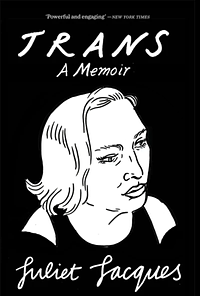Take a photo of a barcode or cover
emotional
informative
reflective
medium-paced
emotional
informative
inspiring
reflective
medium-paced
This brilliantly personal account of Jacques’ transition, gender and sexuality exploration highlights in a casual manner all the way cisgender and heterosexual discourse makers fail to grasp the experiences of the LGBTQ+ community, particularly the trans, genderqueer and gender non-conforming community.
Jacques’ book shows the importance of information as well as the necessity for queer spaces - a dying refuge in many places and explored in passing through the text - and welcoming environments. Going beyond the topic of her “transness”, Juliet Jacques lets her into her world as she explores fashion, style, art, the job market and balancing difficult complexities: being in the public eye while maintaining your privacy and sanity as well as being an activist and spokesperson for your community while allowing yourself to develop your own experience and narrative away from what is “expected”, “better representation” and “serving the community”.
More than providing a deeper understanding of the experiences of some trans people, Jacques’ accounts lead us through what it’s like to be in your 20s and 30s in a ever-changing job market and sociopolitical landscape; trying to find your footing within your identity and politics as well as make a liveable wage. Despite our age gap, her story hits many familiar spots to us millennials and gen Z.
Moderate: Deadnaming, Mental illness, Sexual assault, Suicidal thoughts, Transphobia, Sexual harassment
Minor: Stalking
informative
medium-paced
Jacques is very open in this memoir, writing about how her own experience differed from the media's stereotyped experiences of transgender people. There were parts of this memoir that I found really informative and interesting, such as Jacques' critique of film and television depictions of transgender women and traditional print media's demonising of transgender people.
There was quite a lot of repetition about football and nightlife which weren't so interesting to me, though I can see why the author felt these were important to include.
What I particularly enjoyed were the comparisons between Jacques' own experience of coming out to others and transitioning to that of others and is able to acknowledge the many advantages she had such as an understanding workplace and supportive network. This should be the norm, not the exception but I appreciated Jacques pointing out that it is not.
There was quite a lot of repetition about football and nightlife which weren't so interesting to me, though I can see why the author felt these were important to include.
What I particularly enjoyed were the comparisons between Jacques' own experience of coming out to others and transitioning to that of others and is able to acknowledge the many advantages she had such as an understanding workplace and supportive network. This should be the norm, not the exception but I appreciated Jacques pointing out that it is not.
dark
emotional
funny
hopeful
informative
inspiring
reflective
medium-paced
hopeful
informative
reflective
slow-paced
This book is honest, intimate, and important. As a non-binary trans individual, I related to Juliet’s experience in many ways, while still learning a great deal from someone who is attune to the way literature, art, and politics influences our lived experiences from childhood through the various phases of our transitions. I highly recommend this read for anyone wanting to learn more about the trans experience, especially for trans women. I also appreciated the lens from outside of the US!
informative
reflective
medium-paced
emotional
hopeful
informative
reflective
medium-paced
challenging
emotional
funny
hopeful
informative
inspiring
lighthearted
reflective
medium-paced
After having read memoirs like Nelson's Argonauts, this book disappointed me. I liked her account of the very quotidian experience of transness, of what it means to be trans in a still unforgiving, cruel world that continues to subject trans folks to violence. But in many ways, Jacques' book missed many opportunities to engage with trans theory and to think through Jacques' own experience. Repeatedly, Jacques mentions that she learned about and engaged with trans theory, but we get mostly brief, albeit accessible surveys of trans writing over the years. Her own personal narrative is punctuated by these brief interludes about theory, but there is very little conversation between these seemingly separate parts, which are actually deeply intertwined as Jacques herself implies. Jacques expresses her own concern about writing too individual an account that it can't be useful and accessible to trans readers grappling with their own experience, but I think she could have enabled her readers, academic or not, to engage with trans theory in a truly accessible way. If the personal is indeed political as Jacques says, her memoir could have much more powerfully highlighted this.



